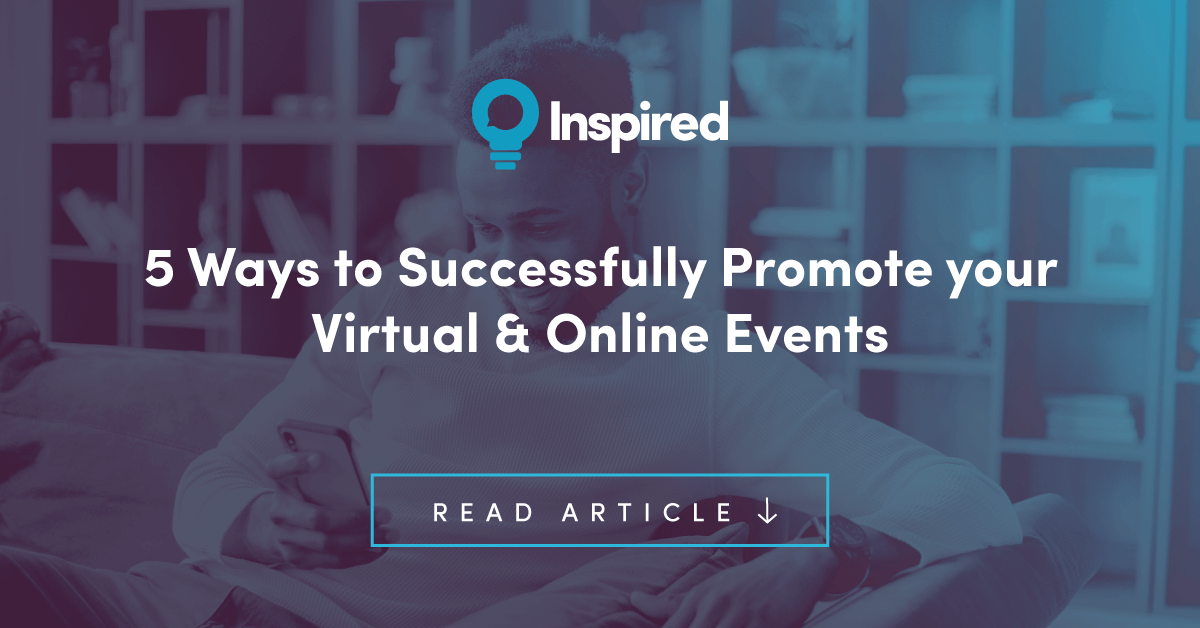5 Ways to Successfully Promote your Virtual & Online Events
From Email Marketing to producing Promotional Content, there are several ways to promote your virtual events. But how do you know which is best for your event?
With virtual and online events here to stay, it’s essential to make sure that the tactics and strategies you’re using to promote these events are successful at engaging audiences and converting leads into sign-ups.
In this blog, we’ll talk you through three ways you can successfully market and advertise your virtual/online events.
1. Email Marketing
Just like physical events, email marketing is a great way of promoting virtual and online events to your target audience. According to one source, 40% of marketers believe it to be the most effective channel for event promotion. The best way to get your audience’s attention is to continually update them with emails whenever an exciting development occurs or line-up announcement occurs that will catch their eye and make them not want to miss out! Be sure to create a standout subject line that will make your audience want to open the email to find out more and sign up!
Email Marketing can be very effective provided you follow three key rules:
- Make sure the data you use is clean and up-to-date. You can face account bans if your bounce rate is too high. Alternatively, consider buying data from a reputable data broker.
- Send relevant content to the recipient. It’s pointless sending information on a marketing event if they work in corporate real estate.
- Make sure your message catches the recipient’s attention. Consider using a catchy subject line or using images.
What are the benefits of Email Marketing?
- Low Cost; Although there may be a cost associated with sending thousands of emails at the same time. These costs are far lower than other marketing alternatives.
- Deliver Targeted Messages; If your virtual event is for those based in EMEA, you can ensure you send emails based on that criteria.
- Easy to Measure; Most email marketing tools allow you to track statistics such as open, bounce and click-through rates. Making it easier to identify which campaigns work and which ones don’t.
- Instant Impact; Once you press send, you can expect results almost immediately. It creates a sense of urgency and can convince your recipients to take action.
2. Create an engaging event landing page
Another way to promote a virtual or online event is to have an engaging and informing event page to drive your audience to. Overall, your landing page should promote the event and make people feel like they will be missing out if they don’t attend. Be sure to communicate details and information simply so that your audience knows exactly what they are signing up for.
Event landing pages offer two key purposes:
- Communication with your audience about what your event is and why they should attend it. There are so many virtual events out there at the moment so you really need to promote your USP’s in order to stand out amongst the crowd.
- Data capture. Landing pages can offer great insights into the people that are interested in your event, which gives you an idea of who will be attending and why.
Tips for writing effective virtual event landing pages:
- Include all relevant details. Make sure that all the details about your online event are included on your landing page. For example: time and date, what platform you’re using, why people should attend, any speakers/sponsors, price transparency and any other information your audience may want to know before attending.
- Give people something to look forward to. Your landing page should include elements of FOMO and can’t-miss excitement to show your audience exactly why they should attend and what they’ll be missing out on if they don’t. This could include a preview of the speaker lineup or highlights from a past event, whatever you choose to showcase make sure it makes your event stand out from the crowd.
- Add a clear call to action. Having a strong call to action on your landing page may be the most important step to encourage your audience to take action and book onto your event. These usually come in the form of a button, however, avoid using generic statements for this and instead tell your audience exactly what you want them to do, such as “Book your … tickets now!”
3. Implement a strong social media strategy
Implementing and executing a strong, promotional social media strategy across a range of platforms can be one of the best ways to promote your online or virtual event. In order to be successful, use a content calendar so that you can plan out exactly what is being shared and when.
Before you start, there are a number of decisions to make. For example, how frequently will you post? What time of the day will you post? What platforms will you use? As well as this, it’s best to have a chunk of content already created and ready to go before starting your social media campaign. This is helpful as it means that you can build a strong brand identity with all your posts looking and sounding consistent.
What are your business goals?
Knowing and understanding your business goals and what you wish to get out of your social media campaigns is essential and can directly influence what and where you post. For example, do you want your social media campaign to raise brand awareness, create new leads, offer customer support? Deciding this before implementing your social media strategy means that you and your team understand what it is you are striving to achieve and can work towards getting the results.
If you want to stay motivated and achieve more results for your company through social media, science recommends setting goals. It’s also important to be able to measure your goals when they’ve been achieved and your campaign has been successful.
Examples of ways to measure the success of your campaign:
- The increase in number of followers
- Engagement with your posts
- Clicks onto your landing page
- New registrations as a result of your content.
What should you post on social media?
Videos
54% of marketers agree that video is the most valuable content format for achieving social goals. Promotional videos should be short but informative to keep your audience engaged and get across your message effectively. Tailor the message of the video to your audience, tell them what your event is about and why they should attend.
It’s important to consider where your video will be posted and choose the right format to work best with that platform. For example, a video posted on Facebook will need to have different dimensions to one posted on LinkedIn.
Event hashtags
When used strategically, hashtags can provide you with a ton of benefits. Creating the right hashtag that you can use across all your posts and social media sites means that your audience will easily be able to find all the information that you’ve already posted about the event. It’s also a great way to promote your event, especially if you encourage others to join in and use the hashtag to let their followers know they will be attending. Creating an event hashtag means that your event is more likely to reach a wider audience which, in turn, means more registrations for your event.
Stories
Taking advantage of the ‘stories’ feature on Instagram and other similar social sites is an effective way to promote your event on social media. Creating countdowns can help to build a sense of urgency, you can make these for speaker announcements, when tickets go live or for the event itself. These countdowns serve as a great visual reminder but also help to build excitement around the event.
Another way to utilise the ‘stories’ feature is to create a stories album that shows up at the top of your page. Here you can store all important information from your stories in one place so that your audience can gain all the insights into your event that they need. Ensure when promoting your event with ‘stories’ that you keep it short and snappy, you have just 15 seconds to hook the audience before your viewers will automatically scroll to the next Story. Stick to revealing important information that will key your audience interested and engaged.
4. Leverage sponsors
Encouraging sponsors to get involved and share content about your online event is a perfect promotional tool as it means that your reach will be increased and you’ll be able to target a wider audience through their followers/connections. Making graphics or videos showcasing your sponsor is a great way to get them involved and encourage them to share content relevant to them.
Explore how you can collaborate with them to accelerate your marketing efforts as getting more attendees is just as beneficial to them as it is to you as an event organiser and promoter as it puts them in front of a larger pool of people.
5. Showcase highlights or promotional content
Creating highlight videos of past similar events is a useful tactic when promoting your online event. Showing the ‘best bits’ of previous events creates a buzz and will (hopefully) make your audience feel like they don’t want to miss out! Showcase any big-name sponsors, speakers or attendees and anything else that may stand out to give your audience a real feel of the event and what they are signing up for!


.png)
.JPG)



